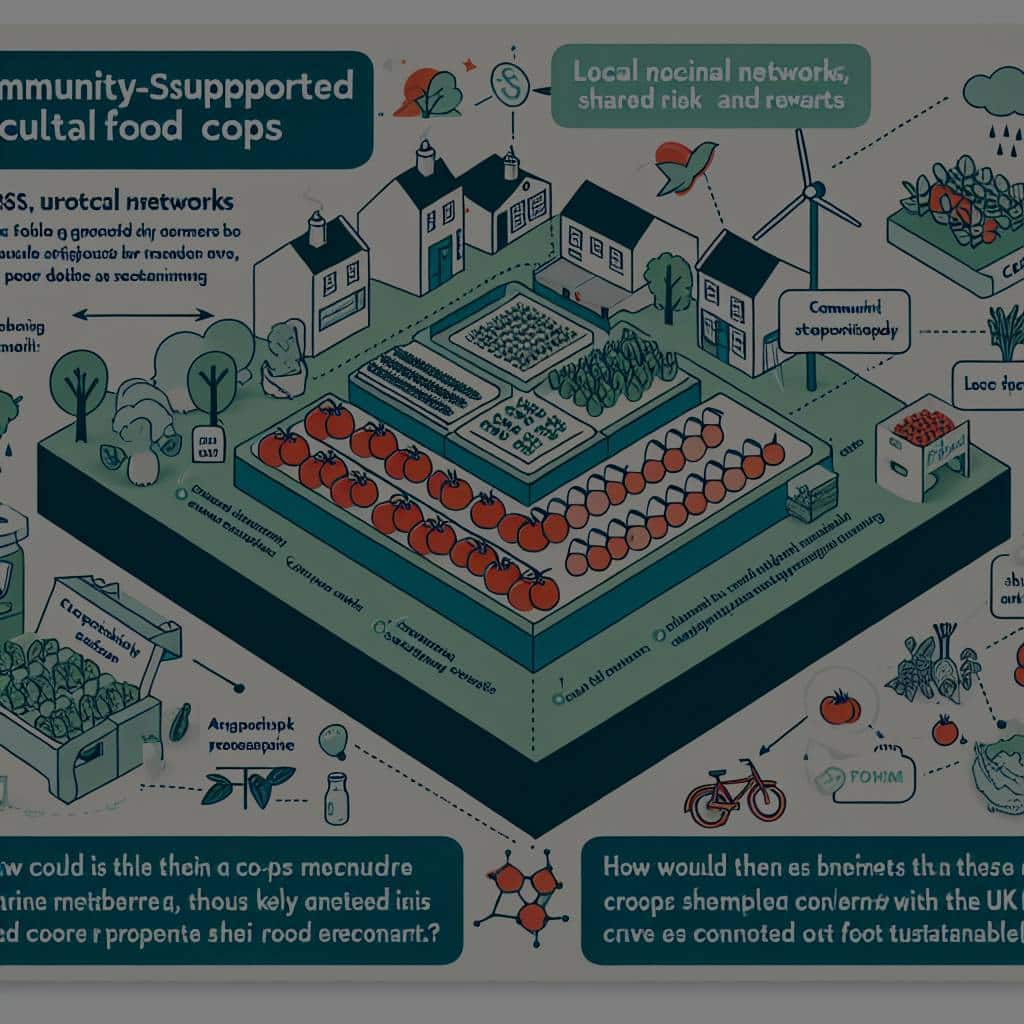How Can UK Food Co-ops Benefit from Community-Supported Agriculture (CSA) Models?

When it comes to food production and distribution, both consumers and farmers are constantly looking for innovative approaches to ensure sustainability. Now, more than ever, the focus has shifted towards locally grown, organic, and sustainably produced food. One such innovation gaining traction is the Community-Supported Agriculture (CSA) model. This article will explore how UK food co-ops can benefit from adopting CSA models. We will delve into the concept, the benefits it offers, and how it can be implemented effectively.
Understanding Community-Supported Agriculture
Community-Supported Agriculture (CSA) represents a contractual agreement between farmers and consumers. Here, consumers become shareholders in a farm’s harvest by purchasing shares at the beginning of the growing season. This ensures the farmers have a guaranteed market for their crops and a degree of financial stability. Simultaneously, shareholders get fresh, locally grown produce on a regular basis, often at lower prices than supermarket counterparts.
Also read : How Can UK Small Towns Leverage Tourism for Economic Development?
The CSA model, born in Japan in the 1960s and 1970s, has gained popularity worldwide. It is now being adopted by many UK food co-ops for its impressive benefits. It’s a win-win situation for farmers and consumers, allowing both parties to reap the benefits of local, sustainable farming practices.
Benefits to UK Food Co-ops
Adopting the CSA model can bring numerous benefits to UK food co-ops, not just in terms of financial stability but also towards building a sustainable and resilient food system.
Topic to read : What Is the Role of Nanotechnology in Enhancing UK Crop Cultivation?
Economic Stability for Farmers
The CSA model can significantly enhance the economic stability of farmers. The upfront payment for shares provides farmers with the necessary financial support at the beginning of the planting season. This allows farmers to plan their crops effectively, manage costs, and reduce the risk of financial loss due to overproduction or unsold produce.
Enhancing Local Food Systems
This model further enhances local food systems. By fostering direct relationships between farmers and consumers, CSAs support local economies and reduce the distance food travels from farm to table. This not only cuts down on carbon emissions but also guarantees fresher, tastier produce for consumers.
Promoting Healthier Eating Habits
The CSA model encourages healthier eating habits. Shareholders often receive a diverse range of vegetables and fruits, some of which they may not typically buy. This can potentially introduce them to new foods and recipes, promoting a varied and balanced diet.
Implementing CSA in UK Food Co-ops
The implementation of the CSA model in UK food co-ops requires careful planning and execution but can yield rewarding results.
Building Strong Relationships with Farmers
A successful CSA model starts with building strong relationships with local farmers. This includes understanding their growing practices, their challenges, and their needs. Regular communication and collaboration are key to ensuring both parties are satisfied with the agreement.
Developing Fair and Transparent Pricing Models
Developing a fair and transparent pricing model is critical to the success of a CSA. The pricing should cover the farmer’s production costs and provide a decent living wage, while also being affordable for shareholders. Transparency in how prices are set can help build trust and ensure the sustainability of the CSA.
Promoting the CSA Model
The promotion of the CSA model to potential shareholders is vital. This involves educating consumers about the benefits of the CSA model, such as access to fresh, local produce, support for local farmers, and contributions to a more sustainable food system.
The Future of CSA in the UK
While the CSA model has gained significant momentum in other parts of the world, it’s still relatively new in the UK. However, as awareness around sustainable and local food systems grows, so too does the potential for CSAs.
Looking forward, with the right support and promotion, CSA models could play a significant role in shaping the future of food co-ops in the UK. Despite the challenges of setting up a CSA, the rewards – in terms of economic stability for farmers, healthier and fresher food for consumers, and a more sustainable and resilient food system – are far reaching.
In conclusion, the CSA model represents an innovative way for UK food co-ops to support local farmers, promote healthier eating habits, and contribute to a more sustainable food system. With careful planning, collaboration, and effective promotion, the CSA model can offer significant benefits to all parties involved.
Ensuring Success of CSA in UK Food Co-ops
A successful integration of the CSA model in UK food co-ops requires vigilant monitoring and regular evaluation. The aim is to identify issues early and address them promptly to ensure the viability of the model over time.
Regular Feedback from Shareholders
Regular feedback from shareholders is crucial. This can be done through surveys or informal conversations. Understanding shareholders’ satisfaction with the quality and variety of the produce they receive, the pricing structure, and the overall process of the CSA is imperative. This data will provide valuable insights to make necessary improvements and maintain shareholder engagement and loyalty.
Continual Farmer Support
Continual support for the farmers is also essential for a successful CSA. This can come in many forms, such as providing resources for improving farming practices, facilitating workshops on sustainable and organic farming methods, and offering support during challenging times, like adverse weather conditions. By ensuring the farmers’ needs are met, UK food co-ops can ensure a steady supply of quality, locally sourced produce.
Regular Review and Adaptation
Lastly, regular review and adaptation of the CSA model are required. Regular analysis of the model’s operation will help identify potential areas of improvement or necessary adjustments. This process will ensure that the CSA continues to be beneficial for all parties involved.
Conclusion: CSA’s Role in UK Food Co-ops
In conclusion, the Community-Supported Agriculture (CSA) model offers a promising approach for UK food co-ops looking to promote locally grown, sustainable food. By adopting the CSA model, these co-ops can offer considerable benefits to local farmers and consumers alike. Farmers enjoy more financial stability and consumers gain access to fresher, more diverse produce while contributing to a more sustainable food system.
The implementation and success of the CSA model hinge on careful planning, building strong relationships with farmers, transparent pricing, and regular monitoring and adaptation. While the model may pose certain challenges, the benefits can be substantial, making it a worthwhile venture for UK food co-ops.
Looking ahead, as awareness about the importance of local, sustainable food systems continues to grow, the CSA model is likely to play an ever-increasing role in the UK food sector. By embracing this model, UK food co-ops stand to not only enhance their operations but also make a meaningful contribution to their communities and the environment.
